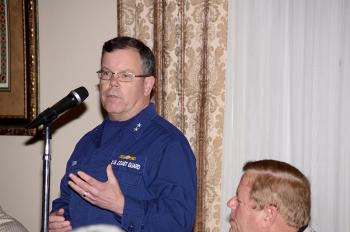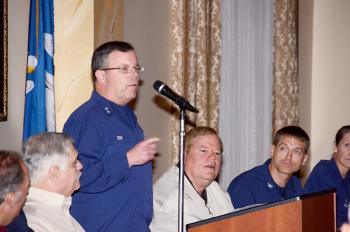
U.S. Coast Guard 8th District Commander Rear Adm. Kevin Cook speaks Thursday at the Petroleum Club of Morgan City.
(The Daily Review Photo by Zachary Fitzgerald)

U.S. Coast Guard 8th District Commander Rear Adm. Kevin Cook speaks Thursday at the Petroleum Club of Morgan City. Seated to Cook’s right are Port of Morgan City Executive Director Raymond “Mac” Wade and Coast Guard Commanding Officer Capt. David McClellan of the Morgan City Marine Safety Unit.
(The Daily Review Photo by Zachary Fitzgerald)
Coast Guard admiral: Adaption critical in Gulf
The U.S. Coast Guard is working closely with other agencies to adapt to the constantly changing industry in the Gulf Coast region to ensure a “level playing field” for all who use the waterways, Rear Adm. Kevin Cook, the U.S. Coast Guard District 8 commander, said Thursday.
The Port of Morgan City hosted Cook for a luncheon meeting at the Petroleum Club of Morgan City. He is responsible for Coast Guard operations in 26 states including the Gulf Coast from Panama City, Florida, to Mexico, and following the Mississippi River all the way to Canada along with the Ohio River, the Missouri River and Arkansas River.
The Coast Guard’s 2015 fiscal year budget, which began in October 2014, will be about the same as its 2014 fiscal year budget, he said. Other than the Department of Homeland Security’s budget, every other agency in the federal government has 2015 budgets fully funded, Cook said.
One of the most engaging aspects of the Coast Guard for Cook is that the activity level never stays the same, he said. The Coast Guard has to adapt to industry changes, and the Coast Guard is generally responsive to those changes, he said.
Cook asked the commandant if he could be assigned to this district position because of his experience with prevention. Cook is also a chemical engineer so he has worked many regulatory projects throughout the years, he said.
Cook tries to emphasize the energy renaissance and its relation to the Coast Guard, he said. Over the past year and a half, an average of about one new tank barge has hit the water every day in his district, he said.
In the petrochemical industry, roughly $100 billion worth of projects are planned in the country with about 90 percent of those projects to take place within Cook’s district, he said. Liquid natural gas production is rising to the top of the industry, he said.
Cook is working to make sure that command staff know that the Coast Guard needs more resources to help personnel better do their jobs through the vessel traffic service, pollution response, facility inspection, and search and rescue, he said.
The Coast Guard does the government’s work in the port community, and is also important in terms of providing a level playing field of safety, which enables business people, recreation waterway users and environmentally-concerned citizens to go about their pursuits on the water, Cook said.
“There is no place like the Gulf Coast in terms of port communities,” Cook said. About two and a half years ago, the Coast Guard developed a process called the “Sectors Staffing Model” to determine what areas needed what resources, he said. “Morgan City and Houma were shown to need a growth of 10 people,” Cook said.
The U.S. Army Corps of Engineers is an important partner for people who live and do business in the area, he said.
The corps is responsible for making sure waterways are deep enough and stay maintained, Cook said. “Although we don’t have direct cognizance over those activities that the Army Corps does, we feel like we do have some influence. And we work with them very closely as intergovernmental partners,” Cook said. Cook has a close relationship with the general in charge of the area division of the corps, he said.
The corps and Coast Guard’s cooperation to make the Crew Boat Cut in the Atchafalaya River the new authorized channel for vessel traffic coming through Morgan City is good example of the two agencies working together, Cook said.
Coast Guard officials also respond to intelligence if terrorist activity or drug activity is suspected, Cook said. On an everyday basis, Marine Safety Unit Morgan City personnel inspect vessels regularly to ensure the vessels are in compliance with safety measures and not participating in illegal activities, Cook said. The Coast Guard also does regular security inspections “to keep the port strong,” he said.
Regarding the drop in the price of oil, Cook said officials have not yet seen an impact to the amount of vessel activity, he said.
As far as trying to prevent another incident similar to the BP oil spill from occurring again, the Coast Guard works extremely closely with the Bureau of Safety and Environmental Enforcement. “They’re the ones who have responsibility for inspection of the actual drilling apparatus and the stuff reaches from the water level down to the well,” Cook said. “And the Coast Guard is responsible for the rig that’s floating out there with all that equipment on it.” The Coast Guard is responsible for the safety of the people, the electrical power distribution and the navigational equipment, Cook said.
Bureau of Safety and Environmental Enforcement and Coast Guard leaders met in order to understand each other’s role better, which has led to some improvements, Cook said. Commanding Officer Capt. David McClellan of Marine Safety Unit Morgan City just met with the Bureau of Safety and Environmental Enforcement Houma office earlier this week, he said.
McClellan said his unit inspects floating offshore installations, drilling units and production units. The unit’s zone of command reaches about 250 miles off the Gulf Coast, McClellan said.
- Log in to post comments
